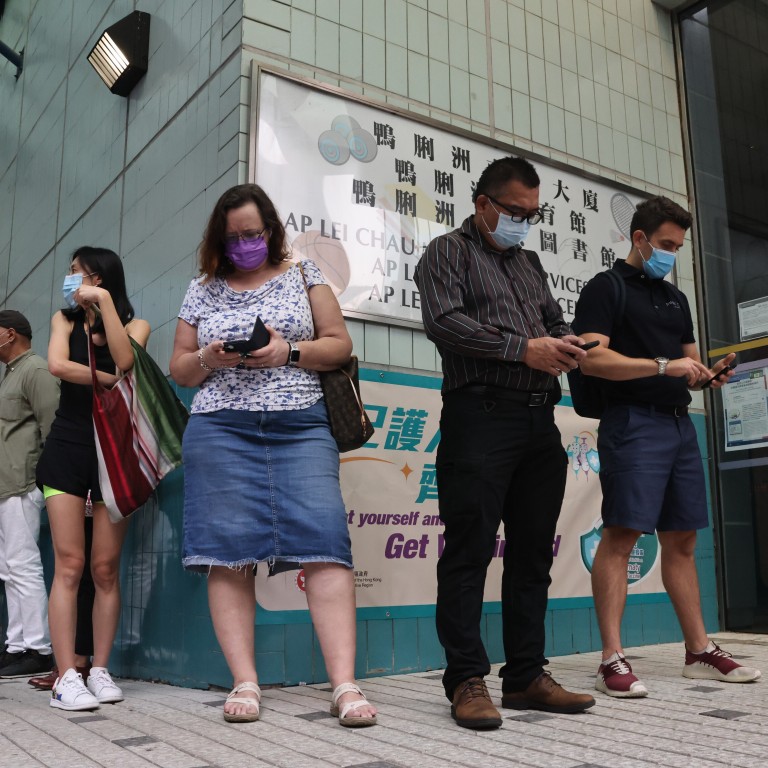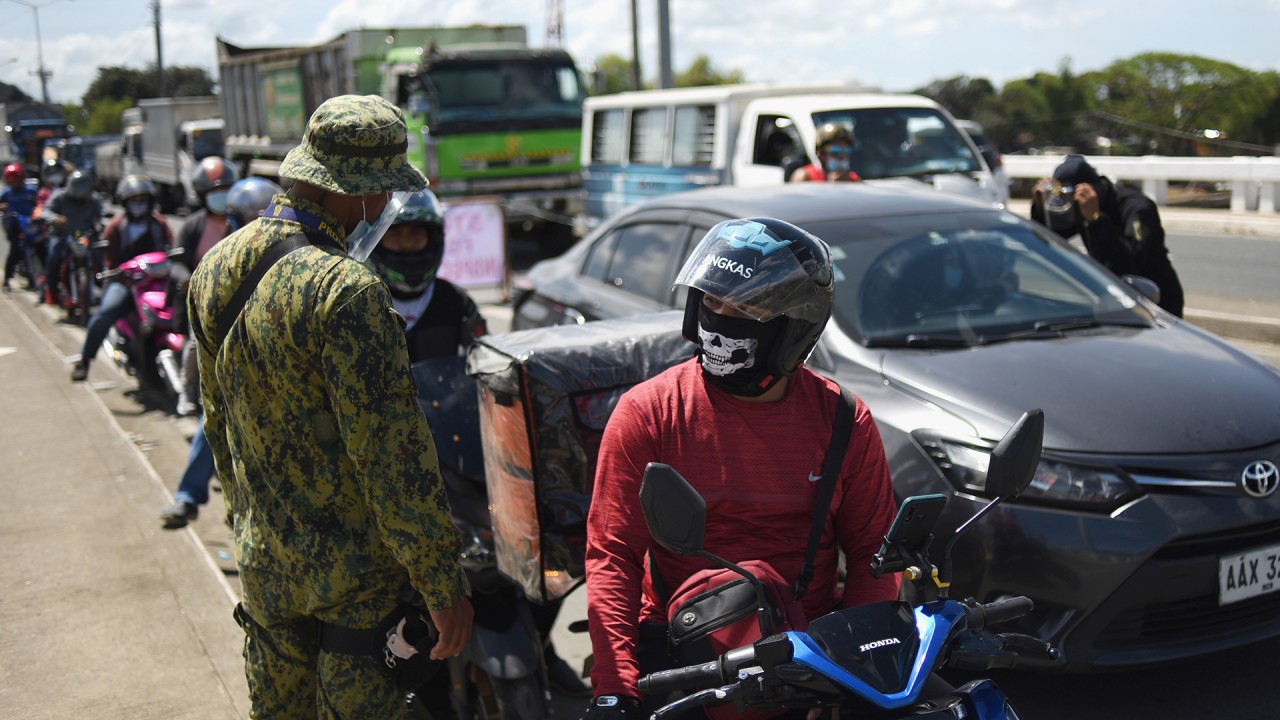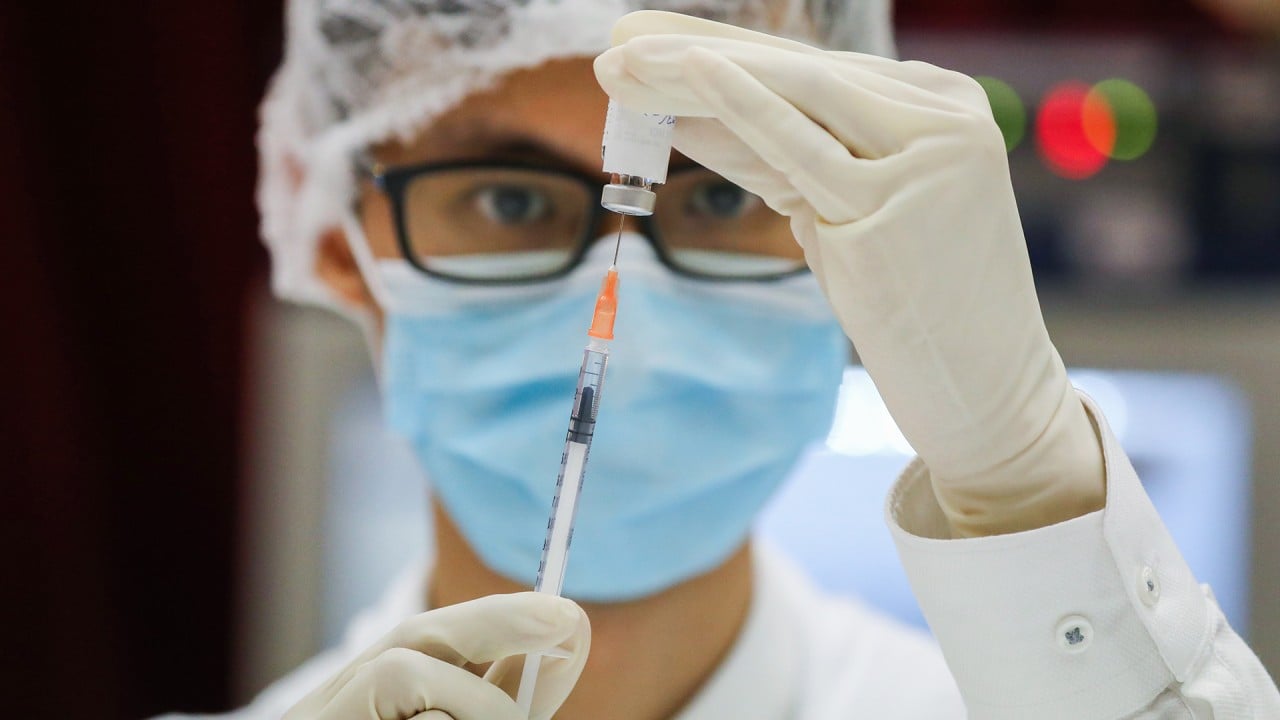
Coronavirus: Hong Kong must stay alert to possible threat posed by Philippines Covid-19 variant, say experts
- Concern mounts over threat from mutation that has appeared in Philippines
- Saturday’s Covid-19 caseload is Hong Kong’s lowest in nearly a week
Hong Kong should remain vigilant over imported Covid-19 cases from the Philippines, medical experts said, pointing to a surge in infections from the country where a new variant was also recently identified.
Their warnings came as Hong Kong recorded just two new cases of coronavirus on Saturday, and bookings for the BioNTech vaccines resumed after being suspended while defective packaging for some vials was investigated.
Of the two new cases, one was a five-year-old boy linked to a previous infection, while the other was an imported case involving an arrival from the Philippines. That patient carried the N501Y mutation, which was first identified in a variant strain from Britain.
So far, the city has recorded at least 159 coronavirus cases with the N501Y mutation, although all were imported.
The mutation has caused concern because it has been linked to a few variants that were more transmissible, such as those first identified in Britain, South Africa and Brazil, as well as the P.3 variant that was first reported in the Philippines in mid-March.
As of March 19, the Philippines had reported 104 infections of the P.3 variant.
While it remained unclear whether any of the imported infections detected in Hong Kong were of the P.3 variant, Dr Chuang Shuk-kwan, from the Centre for Health Protection, previously said arrivals from the Philippines made up “quite a lot” of the N501Y mutation cases.
Latest data from the centre also showed that those who had visited the Philippines made up the most of the imported infections in the past four weeks, accounting for 62, or around 40 per cent, of those cases.
Respiratory medicine specialist Dr Leung Chi-chiu said the Hong Kong government should consider more stringent measures and suspend the entry of foreign domestic workers from the Philippines to minimise risks.
“The problem was not only because of the disproportionately high number of cases, but the threat of a mutated virus was also very high,” Leung said.
While the Philippine health authorities said earlier in the week that no study had established the transmissibility of the P.3 variant, and it was not yet classified as a “variant of concern” by the international health agencies, Leung said there were reasons to suggest a stronger transmissibility.
“Based on the lineage and the locations of mutations of the variant, there were reasons to believe that it had a higher efficiency in transmission and ability to evade the immune system,” he said.
Similar to the several variants that are causing concern in the international community, the P.3 variant also had the mutations of N501Y, which was first seen in the variant reported in Britain, and E484K, which was first found in variants in South Africa and Brazil. But the detailed characteristics of the P.3 variant are still being studied by scientists.
Leung’s suggestions echoed those previously made by the University of Hong Kong’s Dr Ho Pak-leung, who urged the government to suspend non-residents from the Philippines entering the city if a significant number of arrivals were found to have the mutated coronavirus variants.
Professor Yuen Kwok-yung, a government coronavirus adviser, said the government should consider reducing the amount of flights from the Philippines, though he believed there were also other factors for officials to consider when making the decision.
But Professor David Hui Shu-cheong, another pandemic adviser for the government, believed the current 21-day mandatory quarantine for overseas arrivals was effective in detecting those coronavirus variant cases and preventing them from leaking into the community.
The Department of Health said on Saturday it was closely monitoring the variants according to World Health Organization guidelines. All confirmed Covid-19 cases would be genetically screened for key mutations and if identified, whole genome sequencing would be done to ascertain its clade and lineage.
It added that the situation of identifying variants among imported cases only reflected the effectiveness of the port health measures, such as requiring arrivals to wait for Covid-19 test results at the airport and the 21-day mandatory quarantine. The department did not say whether the city had detected any cases of P.3 variants.
Across Asia-Pacific and Europe, Covid-19 throws up another risk – lockdown addiction
Saturday’s cases took the city’s confirmed number of infections to 11,501, with 205 related deaths. Fewer than 10 people also tested preliminary-positive for the coronavirus.
The daily case figure was the lowest in about a week, after the city logged just one case last Sunday but saw a gradual rise to 19 infections – mostly imported or traceable locally – on Friday.
At 9am on Saturday, bookings for the BioNTech vaccines resumed, with slots for the earliest available day fully booked or nearly completely snapped up by noon at more than half of the 21 centres citywide.
There was a waiting time of four minutes to access the online booking page. As appointments for the German-manufactured shots must be made two days in advance, the earliest reservations available fall on Tuesday. By noon on Saturday, slots for Tuesday were full at six stations, and almost completely taken at six other sites. There were still available slots at the nine remaining centres.
Bookings for the jabs at the Hong Kong Sanatorium and Hospital in Happy Valley were full until April 14. For the vaccination centre at Tung Chung Community Hall, the earliest available slots were on April 13.
But there were still openings at other venues such as Yuen Long Sports Centre, Tai Po Hui Sports Centre, and Lung Sum Avenue Sports Centre in Sheung Shui.
The BioNTech jabs were co-developed by firms in Germany and the United States. For the other vaccine currently available in Hong Kong, the Chinese-made Sinovac, reservations at the 18 general outpatient clinics run by the Hospital Authority were mostly full for the coming 16 days. But quotas were still available at five other community vaccination centres.
Distribution of the BioNTech vaccines was abruptly halted last Wednesday on the advice of its supplier after the scheme’s frontline staff reported more than 50 instances of defective vials, including cracks, leaks and exterior stains.
About 300,000 new doses of BioNTech vaccines then arrived on Friday, for the scheme’s relaunch next week.
As of Saturday, 475,100 people, or 6.3 per cent of the city’s population, had received their first dose of a Covid-19 vaccine. Another 68,900 people, or 0.9 per cent of the population, had taken their second shot and were fully vaccinated.





